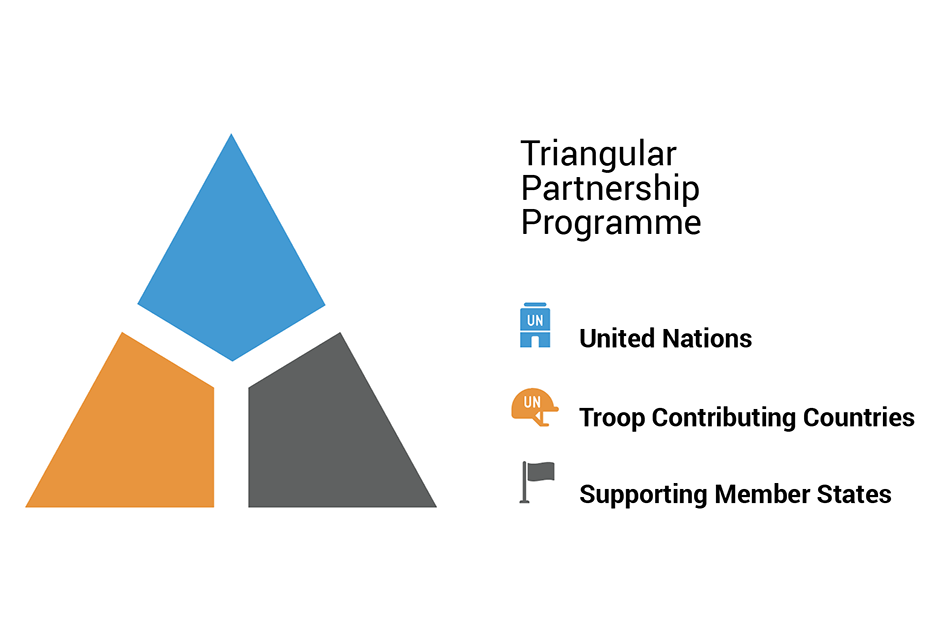As a direct outcome of the 2014 Leaders’ Summit on UN Peacekeeping, the Triangular Partnership Project was launched in 2015 to conduct peacekeeping engineering training in East Africa for uniformed peacekeepers. A decade since its inception, the then Project has since expanded into a full-fledged Programme, the Triangular Partnership Programme (TPP), with four distinct projects. Three are training projects on engineering, medical, and C4ISR (Command, Control, Communications, Computers (C4), Intelligence, Surveillance, and Reconnaissance (ISR)) and camp security technologies, and one is the Telemedicine Project to improve access to medical care in peacekeeping missions. As of 2024, the Programme has expanded its scope beyond UN peacekeeping to also train African Union (AU) Peace Support Operations (PSO) personnel.

Objectives
The TPP aims to enhance peacekeepers’ capacity in engineering, medical, and C4ISR and camp security technologies through the provision of training and operational support. Through TPP trainings, troop-contributing countries (TCCs) are better equipped to deliver high-value support and meet priority requirements, improving the ability of peacekeeping and peace support missions to operate more effectively on the ground. The TPP also provides a framework for improving operational support with initiatives like telemedicine. It also contributes to the implementation of the Action for Peacekeeping (A4P) and Action for Peacekeeping Plus (A4P+).
Training and Operational Support
- Rapid Deployment: Build a pool of well-trained uniformed peacekeepers to support rapid deployment of units to peacekeeping and peace support missions. Previous TPP trainees have deployed to MINUSCA, MINUSMA, MONUSCO, UNIFIL, UNISFA, UNMISS, AMISOM, and ATMIS.
- Flexibility: Deliver training in Africa, Asia Pacific, and South America in partnership with donors and host countries.
- Strengthening Long-term Capacities: Provide Training-of-Trainer (TOT) courses to strengthen regional and national peacekeeping training capacities and ensure knowledge is retained and sustained.
- Cross-pillar Needs: Ensure emerging capability needs are addressed through cross-pillar trainings, for instance, through engineering trainings combined with the Explosive Hazard Awareness Training (EHAT) – in partnership with the United Nations Mine Action Service (UNMAS).
- New Peacekeeping Gaps: Continue to engage with stakeholders to ensure new peacekeeping capability gaps, such as environmental management and Counter-Improvised Explosive Devices (C-IEDs), are identified, and delivered through TPP trainings.
- Telemedicine Network: Strengthen telemedicine networks connecting various levels of medical facilities within missions as well as provisions of remote medical support using telemedicine from external specialists in Member State hospitals (active in MINUSCA, UNMISS, UNDOF, UNSOS, UNSMIL, UNISFA; previously piloted in MINUSMA and MONUSCO).
Support for the Programme
By endorsing the Declaration of Shared Commitments on UN Peacekeeping Operations, more than 150 Member States committed to better prepare, train and equip uniformed personnel by pursuing innovative approaches, including triangular partnerships.
To enhance the sustainability of the Programme, and in line with the upcoming Peacekeeping Ministerial, the United Nations welcomes support from Member States in the form of funding and in-kind contributions across TPP’s pillars.
Contact
- Programme Team: Mr. Takakazu Ito (itot@un.org)
- UN C4ISR Academy for Peace Operations (UNCAP): Mr. David Brazier (brazierd@un.org)
Related Documents
Related Links
Benefits

Training & Operational Support

Progress & Way Forward

